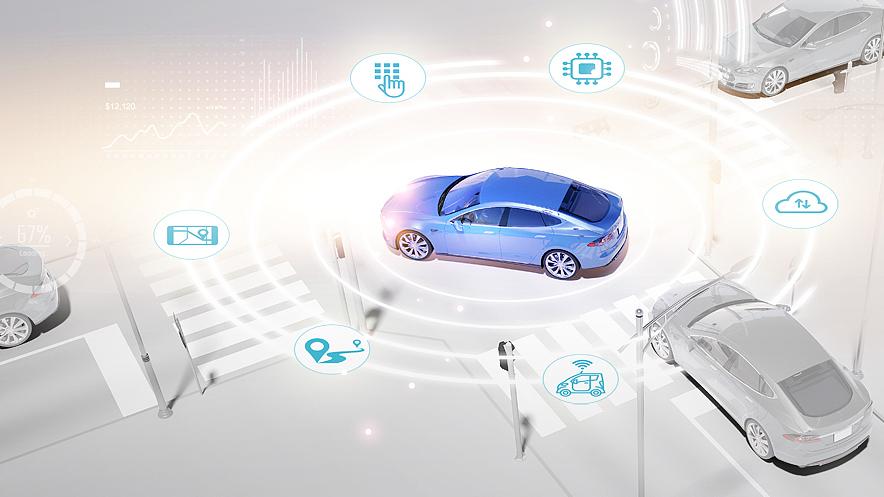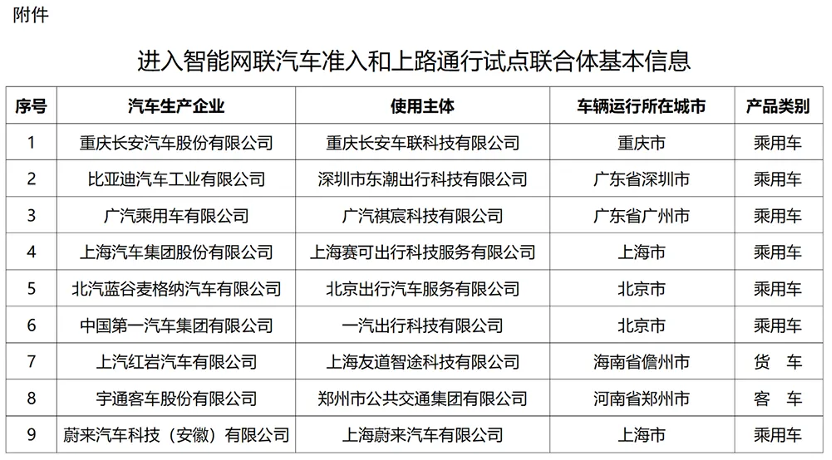The Ministry of Industry and Information Technology recently released the basic information of the pilot group for the entry and on-road operation of intelligent connected vehicles, showing that a total of nine car companies have entered the list of L3 autonomous driving on-road operation pilots nationwide.
According to the latest list, these nine car companies are FAW, SAIC, GAC, Changan, BAIC Blue Valley, BYD, NIO, SAIC Hongyan, and Yutong Bus. Entering the era of intelligent automobiles, advanced intelligent driving is currently the battleground for car companies. With the improvement in the penetration rate of core hardware such as large computing chips and intelligent chassis, combined with the empowerment of AI large models, China’s car companies’ advanced assisted driving capabilities continue to upgrade and evolve. According to the current global progress in autonomous driving technology, industry predictions suggest that by around 2030, autonomous driving may have a certain scale of application. Regarding this latest list of pilot projects, the public also wonders why Tesla, Xiaopeng Motors, and car companies such as BMW and Mercedes-Benz, which are known for their intelligent driving, are not included. Previously, a total of ten car companies in China have obtained L3 level autonomous driving test licenses, including BYD, Zhiji, Deep Blue, WeRide, HoloMatic, Wenyi, Jietu, and GAC Aion.
The list of L3 autonomous driving on-road access was announced, and those qualified are not individual car manufacturers, but a “consortium” called the Intelligent Connected Vehicles Access and On-road Pilot, composed of both car manufacturers and service entities. For example, GAC Aian’s new energy vehicles require technical research and development from GAC Passenger Cars, as well as operational support from Guangzhou Qichen Technology Co., Ltd., which is essentially like Qixing Travel, an intelligent mobile travel platform under GAC Group. In fact, most of the initial users of the Intelligent Connected Vehicles Access and On-road Pilot are ride-hailing platforms under car manufacturers. There are six passenger car service entities, including CheLian Technology, Dongchao Travel, Qichen Technology, Saike Travel, Beijing Travel, and FAW Travel, all of which are ride-hailing platforms. Based on this, some analysts believe that the initial focus of L3 in China is still on the business-to-business sector, and when L3 autonomous driving will be opened to individuals is still uncertain. So, what does it mean for the nine car manufacturers who made it to the list? According to the 2023 Notice, the autonomous driving function carried by Intelligent Connected Vehicles refers to Level 3 and Level 4 driving automation as defined in the national standard “Classification of Automotive Driving Automation.” Specifically, compared to the mature Level 2 advanced driving assistance systems, Level 3 autonomous driving allows drivers to completely release their hands and eyes from the road, no longer needing to constantly control the vehicle’s operation. Importantly, vehicles using Level 3 autonomous driving will be the responsibility of the automaker in the event of a traffic accident, marking a significant milestone in the development of autonomous driving technology. For companies on the pilot list, this means they have the qualifications to develop mass-produced products, which is substantially different from obtaining a Level 3 autonomous driving test license. The announcement states that the pilot implementation is divided into five stages: pilot application, product admission pilot, on-road pilot, pilot suspension and exit, evaluation and adjustment. It is emphasized that the nine consortiums have only completed the pilot application selection stage, which does not mean that intelligent connected vehicles with autonomous driving capabilities have obtained admission permits or are allowed to be on the road. Next, the four departments will guide the consortiums entering the pilot to carry out pilot implementation work. In addition, for the consortiums determined to enter the pilot, automobile manufacturers need to further develop and improve detailed product admission testing and safety assessment plans, and under multi-party supervision, conduct testing and safety assessments as required. Related analysis suggests that advanced intelligent driving is crucial for the future, but more policies need to be put in place for practical application. Nine car companies conducted a pilot test of L3 autonomous driving on the road, marking further improvement in China’s policy support for L3 and L4 autonomous driving on the road.

